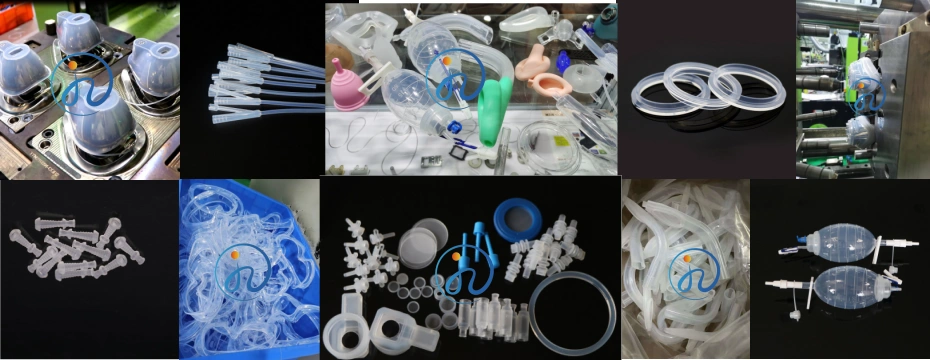Medical-grade Liquid Silicone Rubber (LSR) is a high-purity silicone used in the healthcare industry for a variety of medical and healthcare-related applications. It is a two-component, platinum-cured elastomer that is known for its biocompatibility, flexibility, and resistance to chemicals and heat. Medical-grade LSR is ideal for use in medical devices, implants, and other healthcare products due to its non-toxic, hypoallergenic, and sterilizable nature.
Key Features:
- Biocompatibility: Safe for direct skin or tissue contact and suitable for implants.
- Sterilization: Can be sterilized using common methods like autoclaving, ethylene oxide (EtO), and gamma radiation.
- Chemical Resistance: Resistant to oils, water, and a range of chemicals, which makes it durable in medical environments.
- Durability: High resilience and can maintain its properties over time, even under extreme temperatures (-55°C to +200°C).
- Flexibility and Elasticity: Retains flexibility, making it ideal for soft, flexible medical devices like catheters or gaskets.
- Non-reactive: Inert and non-reactive to human tissue and bodily fluids.
- Hydrophobic: Resists moisture absorption, contributing to its durability and performance in medical devices.
Applications:
- Implants: Long-term implants like pacemaker components or joint replacements.
- Seals and Gaskets: For medical devices like infusion pumps and respirators.
- Catheters and Tubes: Flexible and soft tubing for use in various medical procedures.
- Wearable Devices: Biocompatible materials for smart health monitoring devices.
- Prosthetics and Orthopedics: Custom-fit prosthetics and orthopedic components.

Why Medical Grade LSR? Properties and Advantages
The selection of materials for medical applications is a critical decision, as the products made from these materials often interact directly with the human body. Medical-grade LSR has gained popularity because of its unique combination of properties:
a) Biocompatibility
Perhaps the most significant advantage of medical-grade LSR is its biocompatibility. This ensures that the material does not cause adverse reactions when in contact with human tissue, making it ideal for a wide range of medical devices, implants, and consumables.
b) Chemical Resistance
It is highly resistant to chemicals, oils, and solvents. This resistance allows it to maintain its integrity in harsh medical environments, where it may come into contact with bodily fluids, cleaning agents, or other chemicals.
c) Heat and Cold Resistance
Medical-grade LSR can withstand a broad temperature range, from as low as -55°C to as high as +200°C. This property makes it ideal for devices that must be used or stored in extreme temperatures, as well as those that require sterilization through autoclaving or other high-temperature processes.
d) Sterilization Compatibility
Medical devices and implants must be sterilized before use. Medical-grade LSR is compatible with multiple sterilization methods, including autoclaving, gamma radiation, and ethylene oxide (EtO) sterilization, without losing its mechanical properties or biocompatibility.
e) Flexibility and Durability
Medical-grade LSR offers excellent flexibility, elasticity, and tear resistance, which are essential for devices that need to stretch, bend, or flex. This flexibility also enhances the comfort of wearable medical devices, such as prosthetics or orthopedic components.
f) Moisture Resistance
As a hydrophobic material, medical-grade LSR does not absorb moisture, making it resistant to microbial growth and ensuring its durability in both dry and moist environments. This property is especially important in applications involving prolonged exposure to bodily fluids.